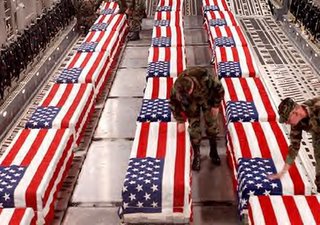A Life, Wasted
Let's Stop This War Before More Heroes Are Killed
By Paul E. Schroeder
 [Supporters stand silently as a lone bagpiper plays "Amazing Grace" during graveside services for Marine Lance Cpl. Edward Schroeder II August 15, 2005, in Cleveland, Ohio. Schroeder, 23, also known to friends and family as "Augie", was one of the 14 Brook Park, Ohio based Marines killed in Iraq during the first weeks of August, 2005.] (Photo: AP/Amy Sancetta)
[Supporters stand silently as a lone bagpiper plays "Amazing Grace" during graveside services for Marine Lance Cpl. Edward Schroeder II August 15, 2005, in Cleveland, Ohio. Schroeder, 23, also known to friends and family as "Augie", was one of the 14 Brook Park, Ohio based Marines killed in Iraq during the first weeks of August, 2005.] (Photo: AP/Amy Sancetta) Early on Aug. 3, 2005, we heard that 14 Marines had been killed in Haditha, Iraq. Our son, Lance Cpl. Edward "Augie" Schroeder II, was stationed there. At 10:45 a.m. two Marines showed up at our door. After collecting himself for what was clearly painful duty, the lieutenant colonel said, "Your son is a true American hero."
Since then, two reactions to Augie's death have compounded the sadness.
At times like this, people say, "He died a hero." I know this is meant with great sincerity. We appreciate the many condolences we have received and how helpful they have been. But when heard repeatedly, the phrases "he died a hero" or "he died a patriot" or "he died for his country" rub raw.
"People think that if they say that, somehow it makes it okay that he died," our daughter, Amanda, has said. "He was a hero before he died, not just because he went to Iraq. I was proud of him before, and being a patriot doesn't make his death okay. I'm glad he got so much respect at his funeral, but that didn't make it okay either."

The words "hero" and "patriot" focus on the death, not the life. They are a flag-draped mask covering the truth that few want to acknowledge openly: Death in battle is tragic no matter what the reasons for the war. The tragedy is the life that was lost, not the manner of death. Families of dead soldiers on both sides of the battle line know this. Those without family in the war don't appreciate the difference.
This leads to the second reaction. Since August we have witnessed growing opposition to the Iraq war, but it is often whispered, hands covering mouths, as if it is dangerous to speak too loudly. Others discuss the never-ending cycle of death in places such as Haditha in academic and sometimes clinical fashion, as in "the increasing lethality of improvised explosive devices."
Listen to the kinds of things that most Americans don't have to experience: The day Augie's unit returned from Iraq to Camp Lejeune, we received a box with his notebooks, DVDs and clothes from his locker in Iraq. The day his unit returned home to waiting families, we received the second urn of ashes. This lad of promise, of easy charm and readiness to help, whose highest high was saving someone using CPR as a first aid squad volunteer, came home in one coffin and two urns. We buried him in three places that he loved, a fitting irony, I suppose, but just as rough each time.
I am outraged at what I see as the cause of his death. For nearly three years, the Bush administration has pursued a policy that makes our troops sitting ducks. While Secretary of State Condoleezza Rice told the Senate Foreign Relations Committee that our policy is to "clear, hold and build" Iraqi towns, there aren't enough troops to do that.
(For more of this)
No comments:
Post a Comment